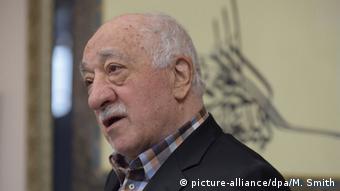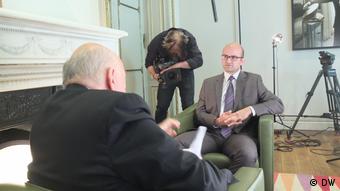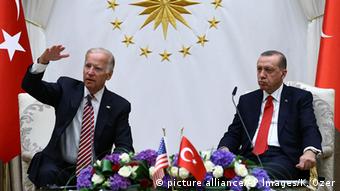is Erdogan right to worry about..............
EUROPE
Is Erdogan right to worry about the Gulen movement?
When a coup failed in Turkey in July, the country's president wasted no time in blaming followers of Fethullah Gulen. Ercan Karakoyun, the director of the Gulen movement in Germany, is Conflict Zone's guest this week.
In May this year, the Turkish government formally designated the Gulen movement a terrorist organization, with President Erdogan declaring, 'We will not let those who divide the nation off the hook in this country.'
After the disastrous coup attempt of July, the president was quick to lay the blame on 'Hizmet', another term for Gulen's followers.
But the movement's leader, Fethullah Gulen, who has lived for the past 19 years in exile in the United States, was once an ally of President Erdogan.
Their hostility is the result of the untidy divorce of Erdogan's AKP and Gulen's Hizmet, which began with a turf war in 2011 and resulted in the break-up of the two most powerful forces within the Turkish state in 2013.
From 2002, their alliance allowed Erdogan to exercise political power, while Gulen's influence grew in the civil service, police, and judiciary.
Until now, efforts of the Turkish government to have Mr. Gulen extradited from the US have so far failed, though talks between officials have taken place since the unsuccessful coup.
'No better scapegoat'
In this week’s interview with Tim Sebastian, Ercan Karakoyun, spokesman for the Gulen movement in Germany and director of the Foundation for Dialogue and Education, explained that for President Erdogan, there was no better scapegoat than 'a pacifistic education movement whose preacher is living in the Pocono mountains, who is very spiritual and who lives a very reclusive life'.
'Under this pretext he is cleansing and purging the whole state,' said Mr. Karakoyun.
Critical observers of President Erdogan have drawn attention to how quickly thousands of people, including civil servants, judges, educators, police, and journalists were rounded up after the attempted coup.
To observers, including Johannes Hahn, the EU Commissioner handling Turkey’s membership bid, it suggested Erdogan’s government had lists already drawn up before the coup of who was to be purged.
'The lists are available, which indicates it was prepared and to be used at a certain stage,' said Hahn.
But while the Gulen movement denies involvement in the coup attempt – and issued a statement shortly after condemning it – commentators and observers say evidence does exist linking followers, if not Fethullah Gulen himself, to the coup.
According to Richard Moore, British Ambassador to Turkey, ‘there is a good deal of understanding that [the Gulenists] had infiltrated other institutions, particularly the police and judiciary.
'But I think we were all surprised at the scale of it in the military – but is it a complete surprise? No – there’ve been reports of Gulenists trying to get in the military as early as the 1990s.'
An organization in the shadows?
The European Council on Foreign Relations think tank has branded the organization 'opaque and secretive', and notes through its participation in show trials of political enemies that, 'With the help of the Turkish government, the Gulen movement successfully created a deep state within the Turkish bureaucracy'.
The group – known as Hizmet in Turkey, meaning 'service' – maintains, however, that it is engaged only in activities related to peace and education.
'We call ourselves Hizmet because it is not a cult, so we don’t reduce our activities on Mr. Gulen. And I think the accusations of Erdogan are absurd because Fethullah Gulen’s preachings … he has always been [democratic], he has always been someone that focused on human rights,' Mr. Karakoyun told Conflict Zone.
But the reclusive leader and the great wealth of his organization cast a shadow of suspicion over the group and its part in the failed coup attempt.
He has built an empire from education and has links to the largest network of charter schools in America, some of which have come under investigation by the FBI for corruption.
'It is suicide to turn back to Turkey'
'Erdogan puts his personal interests above state, he puts his personal interest above law and above judiciary. And in such a situation, it is suicide to turn back to Turkey,' said Mr. Karakoyun when asked by Conflict Zone presenter Tim Sebastian if Fethullah Gulen should return to Turkey to face trial.
If Turkey is indeed becoming less democratic and more authoritarian, as President Erdogan's critics claim, then the possibility of a fair hearing for his enemies appears remote.
But what about the possibility of extradition of Gulen from his refuge in Saylorsburg, Pennsylvania? Turkey has been demanding his repatriation since before the coup attempt, and in August this year US officials met with Turkish counterparts to discuss evidence of Gulen's involvement in the coup as well as other alleged illegal activity.



Comments